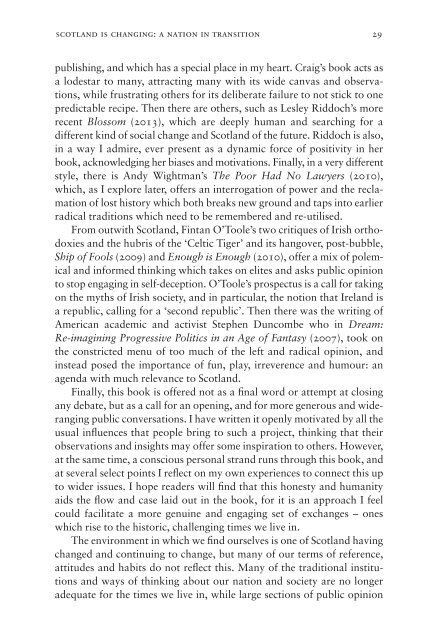Caledonian Dreaming by Gerry Hassan sampler
Caledonian Dreaming: The Quest for a Different Scotland offers a penetrating and original way forward for Scotland beyond the current independence debate. It identifies the myths of modern Scotland, describes what they say and why they need to be seen as myths. Hassan argues that Scotland is already changing, as traditional institutions and power decline and new forces emerge. He outlines a prospectus for Scotland to become more democratic and to embrace radical and far-reaching change.
Caledonian Dreaming: The Quest for a Different Scotland offers a penetrating and original way forward for Scotland beyond the current independence debate. It identifies the myths of modern Scotland, describes what they say and why they need to be seen as myths.
Hassan argues that Scotland is already changing, as traditional institutions and power decline and new forces emerge. He outlines a prospectus for Scotland to become more democratic and to embrace radical and far-reaching change.
Create successful ePaper yourself
Turn your PDF publications into a flip-book with our unique Google optimized e-Paper software.
scotland is changing: a nation in transition 29<br />
publishing, and which has a special place in my heart. Craig’s book acts as<br />
a lodestar to many, attracting many with its wide canvas and observations,<br />
while frustrating others for its deliberate failure to not stick to one<br />
predictable recipe. Then there are others, such as Lesley Riddoch’s more<br />
recent Blossom (2013), which are deeply human and searching for a<br />
different kind of social change and Scotland of the future. Riddoch is also,<br />
in a way I admire, ever present as a dynamic force of positivity in her<br />
book, acknowledging her biases and motivations. Finally, in a very different<br />
style, there is Andy Wightman’s The Poor Had No Lawyers (2010),<br />
which, as I explore later, offers an interrogation of power and the reclamation<br />
of lost history which both breaks new ground and taps into earlier<br />
radical traditions which need to be remembered and re-utilised.<br />
From outwith Scotland, Fintan O’Toole’s two critiques of Irish orthodoxies<br />
and the hubris of the ‘Celtic Tiger’ and its hangover, post-bubble,<br />
Ship of Fools (2009) and Enough is Enough (2010), offer a mix of polemical<br />
and informed thinking which takes on elites and asks public opinion<br />
to stop engaging in self-deception. O’Toole’s prospectus is a call for taking<br />
on the myths of Irish society, and in particular, the notion that Ireland is<br />
a republic, calling for a ‘second republic’. Then there was the writing of<br />
American academic and activist Stephen Duncombe who in Dream:<br />
Re-imagining Progressive Politics in an Age of Fantasy (2007), took on<br />
the constricted menu of too much of the left and radical opinion, and<br />
instead posed the importance of fun, play, irreverence and humour: an<br />
agenda with much relevance to Scotland.<br />
Finally, this book is offered not as a final word or attempt at closing<br />
any debate, but as a call for an opening, and for more generous and wideranging<br />
public conversations. I have written it openly motivated <strong>by</strong> all the<br />
usual influences that people bring to such a project, thinking that their<br />
observations and insights may offer some inspiration to others. However,<br />
at the same time, a conscious personal strand runs through this book, and<br />
at several select points I reflect on my own experiences to connect this up<br />
to wider issues. I hope readers will find that this honesty and humanity<br />
aids the flow and case laid out in the book, for it is an approach I feel<br />
could facilitate a more genuine and engaging set of exchanges – ones<br />
which rise to the historic, challenging times we live in.<br />
The environment in which we find ourselves is one of Scotland having<br />
changed and continuing to change, but many of our terms of reference,<br />
attitudes and habits do not reflect this. Many of the traditional institutions<br />
and ways of thinking about our nation and society are no longer<br />
adequate for the times we live in, while large sections of public opinion


















